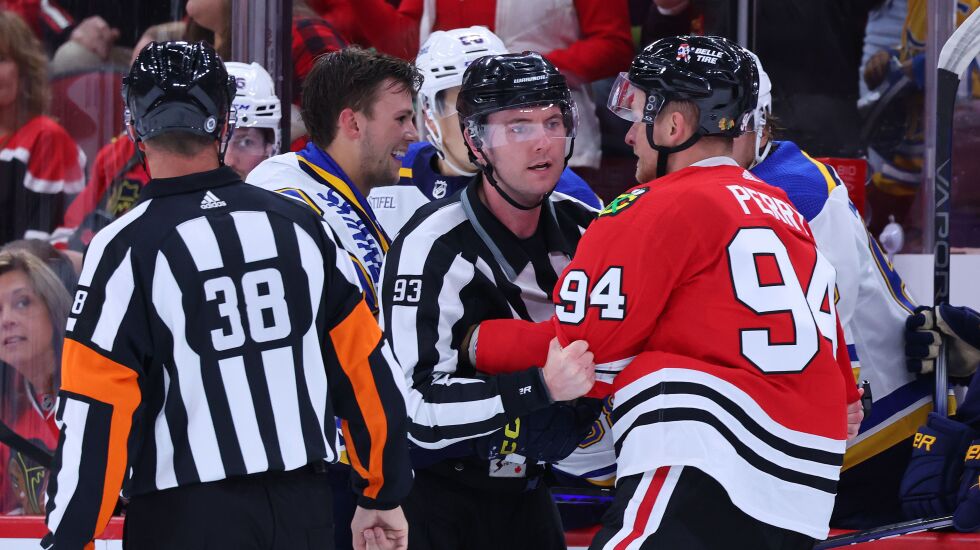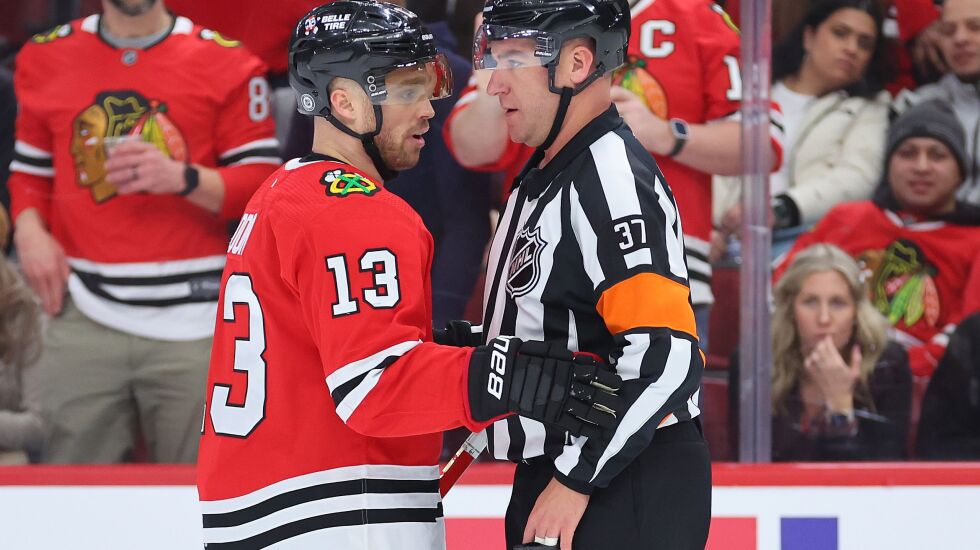
Blackhawks defenseman Connor Murphy learned early in his career about the mettle of NHL referees.
After some long-forgotten bad call years ago, Murphy let his emotions boil over. The response he received has been tattooed inside his brain ever since.
“I just said, ‘You missed a call. That was brutal.’ Or whatever,” he said, laughing at the memory. “[The ref] yelled at me, ‘Who are you? You’ve never done anything in your career. You’re a nobody.’ He went cutthroat right away.”
A decade later, he has come to know many of the referees the Hawks encounter from time to time over the course of each season. He knows which referees like to talk, which referees have softer skin, which referees call certain infractions more strictly, which referees sometimes get out of position and all sorts of other quirks.
And he’s not the only Hawk who pays attention to those things. Nearly every veteran does, actually. The four alternate captains — Murphy, Seth Jones, Nick Foligno and Corey Perry — are all relied upon to maintain consistent communication with the referees and linesmen through each game.
And whenever the Hawks need an explanation of a ruling, need to make their case in a 50-50 call or need to lay the groundwork to hopefully get a makeup call later, their familiarity makes a difference.
“The older-school referees, they have a little bit more conversations with the players,” coach Luke Richardson said. “[For] the younger players who come in now, there are so many rules and they’re under a lot of duress, so they’re focused on that. It’ll take them a little time to get to know a lot of the [referees].”
It’s relevant that there’s so much longevity and such little turnover within the NHL’s referee pool. Out of the league’s 35 full-time referees, 22 entered the season with over 500 games of experience; 11 entered the season with over 1,000 games of experience.
For reference, Corey Perry is one of the league’s oldest active players at age 38, yet there are 12 referees whose debuts predate his 2005-06 rookie season — including five who date back to the 90s.
“Pretty much the same refs have been here for the majority of my career,” Perry said. “You get to know them, and you see them all the time. You just talk to them nicely and maybe you get an extra call here or there — or maybe you don’t.
“Over my career, I’ve learned to not yell at them as much as I used to. I try not to, anyway.”
All four alternate captains each expressed roughly the same sentiment: pointed yet respectful conversations go a lot further than uncontrolled anger.
Said Jones: “There’s definitely an art [to it]. You can’t get too frustrated, because then they shut down and don’t listen to you. A lot of players in our league do go pretty hard at the refs — but they can take it, and a lot of them give it back.”
Said Foligno: “When I was younger...I would be the guy ‘mother-effing’ them a couple times. It comes back to bite you, though. They don’t forget. They’re human, too — just like I wouldn’t forget if a guy says it across the ice from me. As you get older, you try to respect them, and also help the other guys along when they’re getting on them.”
Said Murphy: “A big key is to show them you’re not trying to offend them or not trying to argue. You just want to get a reasonable answer sometimes.”

The Hawks’ game last week at the Golden Knights provided a good case study. The bench was upset that a high hit on Alex Vlasic by Vegas’ Brett Howden wasn’t penalized, and they grew increasingly annoyed as the Knights received four power plays while the Hawks finished regulation with zero.
Nonetheless, the Hawks kept conversations civil — and in overtime, they were rewarded when Dan O’Rourke (in his 24th year as an NHL referee) called a penalty on an iffy trip by Vegas’ William Karlsson on Connor Bedard. They won the game on the ensuing power play.
“Unless you’re a team that’s just not playing the right way, usually the penalties even out at some point throughout the game,” Foligno said. “The refs are conscious of that. We knew we were due for one if we kept going about it the way we were.”
So how were they going about it? What are those civil conversations like?
Sometimes, the conversations include small talk about family life and such in search of common ground. (For example, Foligno and NHL linesman Shandor Alphonso both played junior hockey for the Sudbury Wolves, so they often chat about trips back to Sudbury.) Other times, Hawks players relay to the referees details from one resource they can’t access outside of challenges: instant replay.
“A lot of times, I just go up to them and say, ‘Hey, on that play, I know you saw it this way, but what do you think of this?’” Foligno said. “You try to make them see it from different lenses sometimes.
“It helps them sometimes, too. I’m like, ‘Hey, just so you know, on that one [play], we got the replay and [the stick] was on the skate.’ They appreciate it, as long as you do it in a way that’s respectful. It gives them [the sense of], ‘I’m here to help you.’”
Of course, discussions occasionally do get heated. This is hockey; emotions are inevitable. Watch any Hawks game, and there’s a decent chance you’ll see at least one spit-flying argument.
That happened in dramatic fashion during the Hawks-Coyotes game Monday. Richardson, perhaps confused why a faceoff moved to the Hawks’ defensive zone after a fight in the neutral zone, called Brandon Schrader (the NHL’s second-least experienced referee) over to the bench to yell at him, then waved him away in disgust while muttering some expletives.
When things escalate like that, the only trait that matters is skin thickness.
“You just have to be prepared for them to argue back and get offended,” Murphy said. “You can’t live in a glass house at that point. You have to be willing to take criticism.”
Added Richardson: “Sometimes there’s some verbal fights back and forth, and then you’ve got to go up [to the ref later] and say, ‘Hey, [I’m] sorry. I was a little heated there.’ And then everybody pats each other on the back and goes along their way.”







